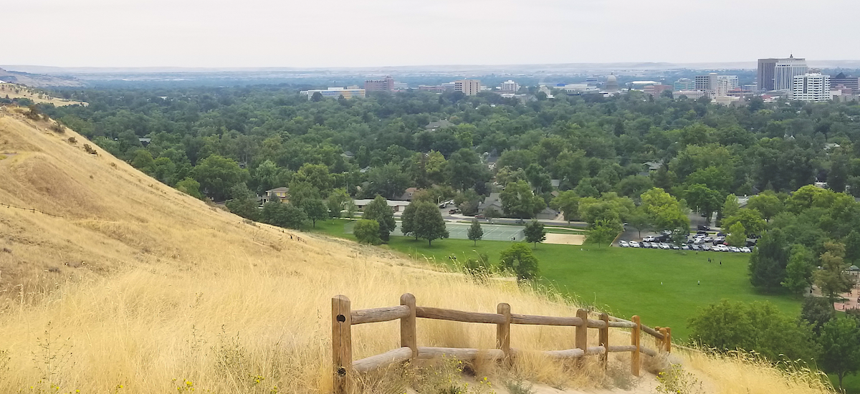Appeals Court Finds That Anti-Camping Ordinance Violates Eighth Amendment Protections

Boise, Idaho, as seen from Camel's Back Park. Michael Grass / Route Fifty

Connecting state and local government leaders
The Martin v. City of Boise ruling offers caution for local governments looking to prosecute homeless people for sleeping on the streets without having adequate shelter resources.
A law in Boise, Idaho, that prohibits sleeping in public spaces violates the U.S. Constitution’s Eighth Amendment protections against cruel or unusual punishment “as it imposes criminal sanctions against homeless individuals for sleeping outdoors, on public property, when no alternative shelter is available to them,” a federal appeals panel ruled Tuesday.
In the 2-1 decision, a 9th U.S. Circuit Court of Appeals panel considered Martin v. City of Boise, a lawsuit brought by six current or formerly homeless Boise residents who challenged their citations under the city’s camping and disorderly conduct ordinances.
In 2014, leaders in Boise amended the city’s anti-camping ordinance, suspending its enforcement when local shelters were full. But the Portland-based judges did not find that adequate.
From a summary of the ruling: “The panel noted that although the 2014 amendment precluded the City from enforcing the ordinances when shelters were full, individuals could still be turned away for reasons other than shelter capacity, such as for exceeding the shelter’s stay limits, or for failing to take part in a shelter’s mandatory religious programs.”
There are three homeless shelters in Boise, all run by nonprofits or religious charities, including one that has a “discipleship program,” which is an “intensive, Christ-based residential recovery program.”
Circuit Court Judge Marsha Berzon wrote that “as long as there is no option of sleeping indoors, the government cannot criminalize indigent, homeless people for sleeping outdoors, on public property, on the false premise they had a choice in the matter.”
Chuck Thompson, the general counsel and executive director of the International Municipal Lawyers Association, told Route Fifty via email on Tuesday that the Boise decision “cautions local governments to assess fully what resources are available to a homeless person before prosecuting the homeless person for sleeping or camping in a public space.”
Moreover, Thompson said: “As a general rule, if shelter space is available a local government may use the criminal process against a homeless person who violates rules against sleeping or camping in public spaces. However, if an otherwise available shelter will not accept the person, then according to the 9th Circuit, the 8th Amendment prohibits the government from prosecuting the person as to do so would ‘criminalize homelessness.’ The decision does not prohibit all regulation of city parks and open spaces, but effectively prohibits enforcement of blanket sleeping and camping prohibitions against people who are without any option for shelter.”
Howard Belodoff, of Idaho Legal Aid Services, Inc., said in a statement that local governments "will have to address real solutions to the complex issues faced by homeless individuals and families rather than just create more barriers and fill more jails with persons who only needed a place to sleep for the night.”
The Boise City Attorney's Office did not respond to a request for comment on Tuesday.
This post has been updated to include additional comment.
Michael Grass is Executive Editor of Government Executive’s Route Fifty and is based in Seattle.

NEXT STORY: Maryland County Makes Condoms Available at Certain High Schools





